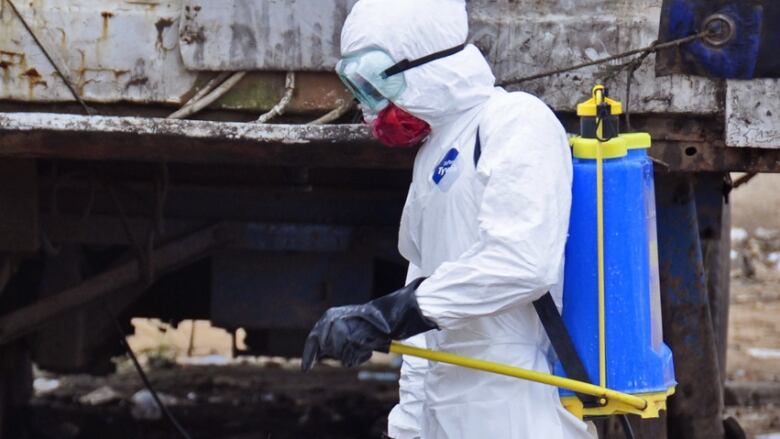Ebola outbreak: Canadian company says its vaccine looks promising
Tests performed by U.S. National Institutes of Health

Four monkeys survived the Ebola virus after being injected with a vaccine that included Immunovaccine Inc's technology, the tiny Canadian company said on Monday, and the announcement sent its stock soaring.
The Halifax, Nova Scotia-based company said four monkeys received the vaccine and later survived a dose of Ebola virus that normally would have been lethal. Two other animals that did not receive the vaccine died within a week.
- Japan offers anti-influenza drug for Ebola treatment
- THE CURRENT: Inside the Ebola quarantine
- Ebola outbreak widens as death toll hits 1,427
- Ivory Coast closes its western borders
- Ebola treatment of Kent Brantly, Nancy Writebol holds lessons for others
- Ebola outbreak: Africans understandably wary about promised cures
- Ebola outbreak demands 'action in the field'
Immunovaccine, which had a market capitalization of about C$77 million as of Friday, is one of a handful of companies involved in testing potential vaccines for the Ebola virus, which has killed nearly 1,500 people in West Africa.
Its Ebola program started a few months ago, after the U.S. National Institutes of Health asked Immunovaccine to apply technology from the company's anthrax vaccine to Ebola. The work was part of NIH tests on possible antigens, substances that cause the immune system to produce antibodies against Ebola.
Unlike antigens in some other early-stage Ebola vaccines, Immunovaccine's antigen does not use a live virus to carry the vaccine into cells.
The company has not disclosed the nature of its antigen.
Generally, it "presents those vaccines to the immune system in a slightly different way so that the immune system processes the vaccine a lot better, and as a result produces stronger immunity to that target," Chief Executive Marc Mansour said in an interview.
He said the company is exploring options to develop the vaccine with various organizations, but would not identify them. Assuming it strikes the partnerships it needs to continue development, clinical trials could start as early as next year, he said.
Other companies testing Ebola vaccines include U.S.-based NewLink Genetics Corp, which holds the licence for a vaccine developed by the Canadian government, privately held Profectus BioSciences and British drugmaker GlaxoSmithKline PLC .
Immunovaccine is also developing therapies for cancer.
Its stock on the TSX Venture Exchange jumped as much as 44 percent after a trading halt, and was up 16.5 percent at C$1.13 in afternoon trading.